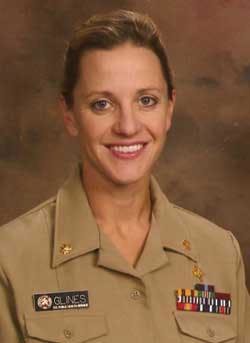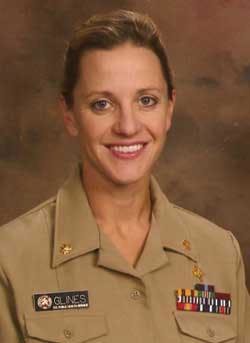Strength in diversity
by Christine Nathe, RDH, [email protected]
The spotlight this month focuses on LCDR Nicole Glines, who had the tremendous opportunity to serve on the USNS Comfort, the ship highlighted in last month's column. “Strength in diversity,” the U.S. Public Health Service (USPHS) motto, held true for Nicole, as she was one of 16 dental hygienists in the USPHS Commissioned Corps who had the opportunity to serve aboard the USNS Comfort, a Navy hospital ship, during its four–month deployment to Latin America and the Caribbean. The deployment was labeled “Partnership for the Americas: USNS Comfort offers Humanitarian Assistance to countries in South and Central America.” I had the opportunity to ask Nicole a few questions.
Why did you decide to go into dental hygiene?
I was a nontraditional student, having just completed my military obligation in the Navy, when I started the dental hygiene program at the University of South Dakota in Vermillion. At that time I held a certification as a medical laboratory technician, and although I enjoyed the scientific aspect and pathology of the lab, I wanted my future to include patient interaction. Dental hygiene satisfied both those interests.
How did you get into dental public health?
When I graduated from dental hygiene, I chose to work in private practice and was recruited to take an active part in the South Dakota Dental Hygienists' Association. This was an eye opening opportunity for me as it allowed me to further my views on the roles of a dental hygienist, and exposed me to other professional issues associated with our profession. During this time I was mentored in many diverse aspects, including legislative activity and community outreach. I attended an ADHA annual session where the U.S. Public Health Service Commissioned Corps had an exhibit and recruitment booth.
I contacted a USD alumnus who served as a community and clinical dental hygienist with Indian Health Services. My professional course changed directions when I submitted my application to be commissioned as an officer in the U.S. Public Health Service. Education always opens doors for opportunities, and it's no different in public health. There are programs that currently recognize all levels of dental hygiene degrees within the Commissioned Corps for job placement. One thing is certain — once an officer is in the field, he or she will benefit from gaining further education.
What is your current position?
I serve as a community and clinical dental hygienist with Indian Health Services stationed with the Oglala Sioux Tribe in Pine Ridge, S.D. My position is both challenging and rewarding as I work with special populations such as diabetics and prenatal moms, and in the community with Head Start, Child Care, and WIC (Women, Infants, and Children) to name a few. Much of my time is spent in schools managing school sealant programs and fluoride mouth rinse. I'm involved in other activities, such as serving as a trainer and consultant for tobacco cessation activities in dental offices throughout South Dakota, as well as professional group activities within the Commissioned Corps.
Can you discuss any particularly interesting experiences you have had in your dental public health positions?
The most interesting part of my job is working with collaborative partners in projects with a common goal and the learning that comes from this. For instance, the population I serve experiences a very high rate of early childhood caries. It is imperative to form partnerships with groups that have access to children and families to address the issue from a prevention standpoint as opposed to treatment. Because of this, I've had the opportunity to participate in research projects led by academia from major universities, marketing and communication experts, and those at the grassroots level, that have helped develop culturally appropriate educational resources and served as the driving force in creating change.
What type of advice would you give to a practicing hygienist thinking of doing something different?
Public health affects your community, and it provides ample opportunities that are not always openly discussed. Volunteering for projects or civic group activities leads to networking resources. These can expand into diverse opportunities that may or may not have an oral component, but can still benefit from a dental hygienist's involvement.
If a career in public health is in your future, I would recommend looking at the different directions of public health such as research, epidemiology, health promotion and disease prevention, or clinical services. Education and practical experiences beyond a traditional dental hygiene degree are both beneficial and highly recommended when making the transition. The challenges and experiences are unlimited when you enter a public health profession.
About the Author
Christine Nathe, RDH, MS, is a professor and graduate program director at the University of New Mexico, Division of Dental Hygiene, in Albuquerque, N.M. She is also the author of “Dental Public Health” (www.prenhall.com/nathe), which is in its second edition with Prentice Hall. She can be reached at [email protected] or (505) 272–8147.

